1 of 8
Download to read offline
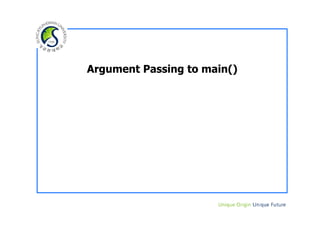
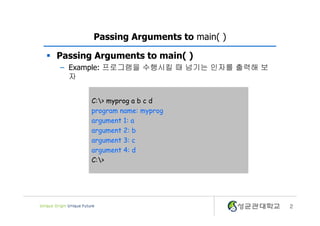
![3
Passing Arguments to main( )
┬¦ Passing Arguments to main( )
ŌĆō CņŚÉņä£ ĒöäļĪ£ĻĘĖļשņØä ņŗżĒ¢ēņŗ£Ēé¼ ļĢī command lineņŚÉņä£ ņŻ╝ņ¢┤ņ¦ĆļŖö
argumentsļź╝ main( ) functionņŚÉ pass.
ŌĆó argc : command lineņŚÉņä£ argumentsņØś Ļ░£ņłś
ŌĆó argv : argumentsņØś valueļź╝ ņĀäļŗ¼ ļ░øĻĖ░ ņ£äĒĢ£ String array
[Ex] int main(int argc, char *argv[])
[Ex] myprog c java pascal
argc = 4
argv[0] => ŌĆ£myprogŌĆØ
argv[1] => ŌĆ£cŌĆØ
argv[2] => ŌĆ£javaŌĆØ
argv[3] => ŌĆ£pascalŌĆØ](https://image.slidesharecdn.com/15-2-140406045937-phpapp02/85/15-2-arguement-passing-to-main-3-320.jpg)
![4
Passing Arguments to main( )
[Ex] #include <stdio.h>
int main (int argc, char *argv[]){
int count;
printf(ŌĆ£program name: %snŌĆØ, argv[0]);
if(argc > 1){
for( count=1; count < argc; count++ )
printf(ŌĆ£argument %d = %snŌĆØ, count, argv[count]);
}
else
puts(ŌĆ£No comand line argumentsŌĆØ);
return 0;
}
> a.out hi hello
program name: a.out
argument 1 = hi
argument 2 = hello](https://image.slidesharecdn.com/15-2-140406045937-phpapp02/85/15-2-arguement-passing-to-main-4-320.jpg)
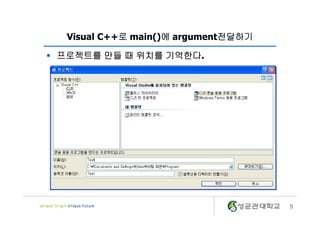
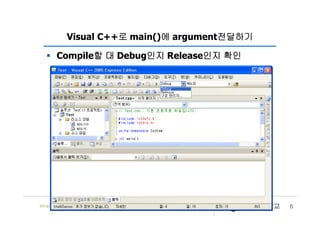
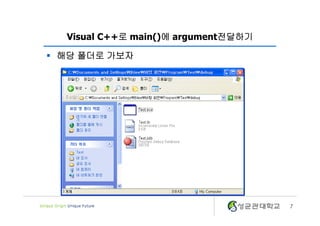
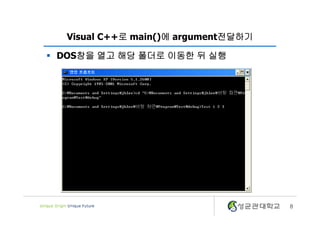
Ad
Recommended
RNC C++ lecture_5 Array
RNC C++ lecture_5 Arrayitlockit
╠²
This ppt is a ppt for a C ++ basic lecture.
This lecture is to learn about arrayRNC C++ lecture_2 operator, if
RNC C++ lecture_2 operator, ifitlockit
╠²
This ppt is a ppt for a C ++ basic lecture.
The third lecture learns about operators and if statements.RNC C++ lecture_4 While, For
RNC C++ lecture_4 While, Foritlockit
╠²
This ppt is a ppt for a C ++ basic lecture.
The fourth lecture learns about the repeating While and For.15 3. modulization
15 3. modulizationņøģņŗØ ņĀä
╠²
The document discusses techniques for modularizing source code into separate files when developing large programs. It recommends splitting source code into multiple .c and .h files with each function defined in its own .c file and declared in a corresponding .h file. Header files should include function prototypes and extern declarations. Conditional compilation with #ifndef and #define is used to prevent header files from being included multiple times. This modular approach makes the code easier to maintain, compile and work on collaboratively.9. pointer, pointer & function
9. pointer, pointer & functionņøģņŗØ ņĀä
╠²
The document discusses pointers in C programming. Some key points:
- Pointers store the address of a variable in memory. Pointer variables hold the address of other variables.
- To access the value of the variable a pointer points to, you dereference the pointer using *.
- Pointer variables are passed by value like other variables in C, so any changes made to the pointer or value it points to inside a function will not be reflected outside the function.Function pointer
Function pointerShih-Hsiang Lin
╠²
This document discusses function pointers, callback functions, functors, and the observer pattern in C and C++. It begins by explaining the syntax of function pointers and how they can point to the address of a function. It then discusses how callback functions allow a caller function to pass a function pointer as an argument, uncoupling the caller from the callee. Functors are described as functions with state that can act like functions through operator overloading. The observer pattern is explained as defining dependencies between objects so that one object (the subject) notifies observer objects of any state changes.ņĮöļö®ņØĖņ╣┤ĒÄś C&JAVA ĻĖ░ņ┤łĻ│╝ņĀĢ CĒöäļĪ£ĻĘĖļלļ░Ź(3)
ņĮöļö®ņØĖņ╣┤ĒÄś C&JAVA ĻĖ░ņ┤łĻ│╝ņĀĢ CĒöäļĪ£ĻĘĖļלļ░Ź(3)ņ£ĀņØĄņĢč½╣┤ļŹ░ļ»Ė
╠²
ņĮöļö®ņØĖņ╣┤ĒÄś 1ĻĖ░ C&JAVA ĻĖ░ņ┤łĻ│╝ņĀĢ 6ĒÜīņ░© ņłśņŚģ ņ×ÉļŻī(ņØ╝ļČĆ ļ░£ņĘīļé┤ņÜ®)Ļ▓īņ×äĒöäļĪ£ĻĘĖļלļ░Źņ×ģļ¼Ė 3ņŻ╝ņ░©
Ļ▓īņ×äĒöäļĪ£ĻĘĖļלļ░Źņ×ģļ¼Ė 3ņŻ╝ņ░©Yeonah Ki
╠²
Ļ▓īņ×äĒöäļĪ£ĻĘĖļלļ░Źņ×ģļ¼Ė 3ņŻ╝ņ░© ņłśņŚģņ×ÉļŻīņ×ģļŗłļŗżßäÆßģĪßå©ßäĆßģŁßäŗßģ”ßäēßģź ßäćßģóßäŗßģ«ßäīßģĄ ßäŗßģĪßåŁßäéßģ│ßå½ C
ßäÆßģĪßå©ßäĆßģŁßäŗßģ”ßäēßģź ßäćßģóßäŗßģ«ßäīßģĄ ßäŗßģĪßåŁßäéßģ│ßå½ CHeesuk Kang
╠²
D2 CAMPUS PARTNER > Zeropage & CLUG ņśżĒöłņ║ĀĒöä13. structure
13. structureņøģņŗØ ņĀä
╠²
This document discusses structures in C programming. It explains that structures can contain elements of different data types, accessed by name, unlike arrays where all elements must be of the same type and accessed by index. It provides examples of declaring a structure type with members, defining structure variables, accessing members using the dot operator, passing structures to functions, and initializing an array of structures.More Related Content
Similar to 15 2. arguement passing to main (18)
ņĮöļö®ņØĖņ╣┤ĒÄś C&JAVA ĻĖ░ņ┤łĻ│╝ņĀĢ CĒöäļĪ£ĻĘĖļלļ░Ź(3)
ņĮöļö®ņØĖņ╣┤ĒÄś C&JAVA ĻĖ░ņ┤łĻ│╝ņĀĢ CĒöäļĪ£ĻĘĖļלļ░Ź(3)ņ£ĀņØĄņĢč½╣┤ļŹ░ļ»Ė
╠²
ņĮöļö®ņØĖņ╣┤ĒÄś 1ĻĖ░ C&JAVA ĻĖ░ņ┤łĻ│╝ņĀĢ 6ĒÜīņ░© ņłśņŚģ ņ×ÉļŻī(ņØ╝ļČĆ ļ░£ņĘīļé┤ņÜ®)Ļ▓īņ×äĒöäļĪ£ĻĘĖļלļ░Źņ×ģļ¼Ė 3ņŻ╝ņ░©
Ļ▓īņ×äĒöäļĪ£ĻĘĖļלļ░Źņ×ģļ¼Ė 3ņŻ╝ņ░©Yeonah Ki
╠²
Ļ▓īņ×äĒöäļĪ£ĻĘĖļלļ░Źņ×ģļ¼Ė 3ņŻ╝ņ░© ņłśņŚģņ×ÉļŻīņ×ģļŗłļŗżßäÆßģĪßå©ßäĆßģŁßäŗßģ”ßäēßģź ßäćßģóßäŗßģ«ßäīßģĄ ßäŗßģĪßåŁßäéßģ│ßå½ C
ßäÆßģĪßå©ßäĆßģŁßäŗßģ”ßäēßģź ßäćßģóßäŗßģ«ßäīßģĄ ßäŗßģĪßåŁßäéßģ│ßå½ CHeesuk Kang
╠²
D2 CAMPUS PARTNER > Zeropage & CLUG ņśżĒöłņ║ĀĒöäMore from ņøģņŗØ ņĀä (20)
13. structure
13. structureņøģņŗØ ņĀä
╠²
This document discusses structures in C programming. It explains that structures can contain elements of different data types, accessed by name, unlike arrays where all elements must be of the same type and accessed by index. It provides examples of declaring a structure type with members, defining structure variables, accessing members using the dot operator, passing structures to functions, and initializing an array of structures.6. function
6. functionņøģņŗØ ņĀä
╠²
The document discusses call-by-value in function invocation in C. When a function is called, only the values of the arguments are passed to the function, not the variables themselves. So any changes made to the parameters inside the function are not reflected in the calling function. This causes an issue when trying to swap variables by passing them to a Swap function.Ad
15 2. arguement passing to main
- 1. Argument Passing to main()
- 2. 2 Passing Arguments to main( ) ┬¦ Passing Arguments to main( ) ŌĆō Example: ĒöäļĪ£ĻĘĖļשņØä ņłśĒ¢ēņŗ£Ēé¼ ļĢī ļäśĻĖ░ļŖö ņØĖņ×Éļź╝ ņČ£ļĀźĒĢ┤ ļ│┤ ņ×É C:> myprog a b c d program name: myprog argument 1: a argument 2: b argument 3: c argument 4: d C:>
- 3. 3 Passing Arguments to main( ) ┬¦ Passing Arguments to main( ) ŌĆō CņŚÉņä£ ĒöäļĪ£ĻĘĖļשņØä ņŗżĒ¢ēņŗ£Ēé¼ ļĢī command lineņŚÉņä£ ņŻ╝ņ¢┤ņ¦ĆļŖö argumentsļź╝ main( ) functionņŚÉ pass. ŌĆó argc : command lineņŚÉņä£ argumentsņØś Ļ░£ņłś ŌĆó argv : argumentsņØś valueļź╝ ņĀäļŗ¼ ļ░øĻĖ░ ņ£äĒĢ£ String array [Ex] int main(int argc, char *argv[]) [Ex] myprog c java pascal argc = 4 argv[0] => ŌĆ£myprogŌĆØ argv[1] => ŌĆ£cŌĆØ argv[2] => ŌĆ£javaŌĆØ argv[3] => ŌĆ£pascalŌĆØ
- 4. 4 Passing Arguments to main( ) [Ex] #include <stdio.h> int main (int argc, char *argv[]){ int count; printf(ŌĆ£program name: %snŌĆØ, argv[0]); if(argc > 1){ for( count=1; count < argc; count++ ) printf(ŌĆ£argument %d = %snŌĆØ, count, argv[count]); } else puts(ŌĆ£No comand line argumentsŌĆØ); return 0; } > a.out hi hello program name: a.out argument 1 = hi argument 2 = hello
- 5. 5 Visual C++ļĪ£ main()ņŚÉ argumentņĀäļŗ¼ĒĢśĻĖ░ ┬¦ ĒöäļĪ£ņĀØĒŖĖļź╝ ļ¦īļōż ļĢī ņ£äņ╣śļź╝ ĻĖ░ņ¢ĄĒĢ£ļŗż.
- 6. 6 Visual C++ļĪ£ main()ņŚÉ argumentņĀäļŗ¼ĒĢśĻĖ░ ┬¦ CompileĒĢĀ ļīĆ DebugņØĖņ¦Ć ReleaseņØĖņ¦Ć ĒÖĢņØĖ
- 7. 7 Visual C++ļĪ£ main()ņŚÉ argumentņĀäļŗ¼ĒĢśĻĖ░ ┬¦ ĒĢ┤ļŗ╣ ĒÅ┤ļŹöļĪ£ Ļ░Ćļ│┤ņ×É
- 8. 8 Visual C++ļĪ£ main()ņŚÉ argumentņĀäļŗ¼ĒĢśĻĖ░ ┬¦ DOSņ░ĮņØä ņŚ┤Ļ│Ā ĒĢ┤ļŗ╣ ĒÅ┤ļŹöļĪ£ ņØ┤ļÅÖĒĢ£ ļÆż ņŗżĒ¢ē
